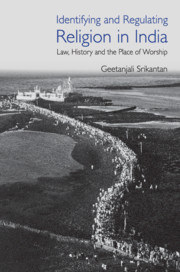Book contents
- Frontmatter
- Contents
- Acknowledgements
- Introduction
- 1 Secularisation and Theologisation: The Making of ‘Hindu Law’ and British Colonialism
- 2 The Role of Legal Hermeneutics as Secularisation in the Formation of Anglo-Muhammadan Law
- 3 Influences and Confluences: The Theological Foundations of Western Property Law and the Place of Worship in India
- 4 Identifying ‘Doctrine’: Tracing Theologisation in Legal Narratives of the Place of Worship in India
- 5 Rethinking Definitions: Hinduism as Religion in the Indian Supreme Court
- Conclusion
- Glossary
- List of Cases
- Bibliography
- Index
Introduction
Published online by Cambridge University Press: 30 April 2020
- Frontmatter
- Contents
- Acknowledgements
- Introduction
- 1 Secularisation and Theologisation: The Making of ‘Hindu Law’ and British Colonialism
- 2 The Role of Legal Hermeneutics as Secularisation in the Formation of Anglo-Muhammadan Law
- 3 Influences and Confluences: The Theological Foundations of Western Property Law and the Place of Worship in India
- 4 Identifying ‘Doctrine’: Tracing Theologisation in Legal Narratives of the Place of Worship in India
- 5 Rethinking Definitions: Hinduism as Religion in the Indian Supreme Court
- Conclusion
- Glossary
- List of Cases
- Bibliography
- Index
Summary
Regularting Religion: Challenging Contemporary Pespectives
In the judgment dated 30 September 2010 adjudicating claims of Hindu groups over the demolished Babri Masjid mosque in Ayodhya, Justice Sharma of the Allahabad High Court made the controversial pronouncement that the Hindu deity Lord Ram was born in Ayodhya at the location under the central dome of the mosque. In further acceding to the claims of the Hindu groups, Justice Sharma declared that belief in the birthplace of Ram is protected by the right to religious freedom enshrined in Article 25 of the Indian Constitution. Since Article 25 was a fundamental right, there could be no action by the court that sought to restrict or altogether extinguish this right.
The Allahabad High Court's judgment is controversial for its imagination of religious freedom in the context of a destroyed place of worship. This judgment was the result of a 100-year-old litigation that revolved around whether the birthplace of a Hindu deity Ram is on the site of a temple demolished by the Mughal emperor Babur in the sixteenth century. This litigation began in 1885 causing widespread violence and conflict throughout the country. In the 1980s, it became a symbol for agitation and protest by Hindu political parties such as the Bharatiya Janata Party (BJP). The BJP began a movement known as the Rath Yatra mobilising thousands across the country to build the temple at Ayodhya. This eventually resulted in the demolition of the mosque on 6 December 1992 by members of various Hindu political groups. These groups demanded the rebuilding of the temple at the site of the demolished mosque. These demands were taken up by the High Court of Allahabad, which had local jurisdiction in this case, and resulted in the proclamation that the innermost shrine of the mosque was the birthplace of the deity Ram according to Hindu belief protected by Article 25 of the Indian Constitution.
The nature of Hindu belief is elucidated by Justice Agarwal, another judge on the same bench, by commenting that
once such belief gets concentrated to a particular point, and in totality of the facts, we also find no reason otherwise, it partakes the nature of an essential part of religion particularly when it relates to a matter which is of peculiar significance to a religion.
Information
- Type
- Chapter
- Information
- Identifying and Regulating Religion in IndiaLaw, History and the Place of Worship, pp. 1 - 17Publisher: Cambridge University PressPrint publication year: 2020
